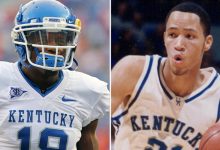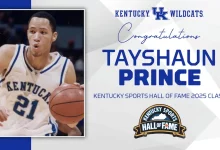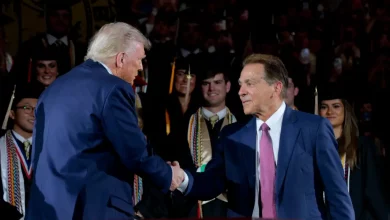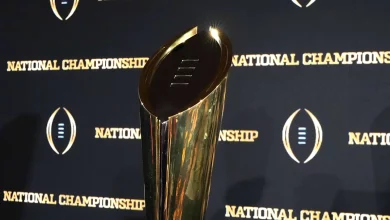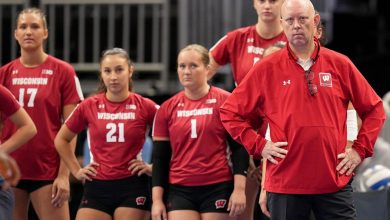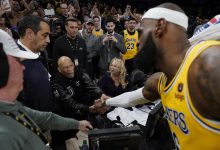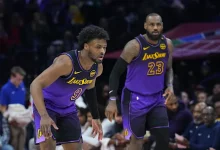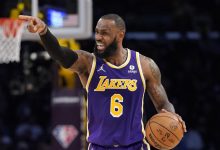Mychal Thompson is ready to mentor Deandre Ayton in Los Angeles, encouraging him by saying he could become the Lakers’ next great center with the right guidance.
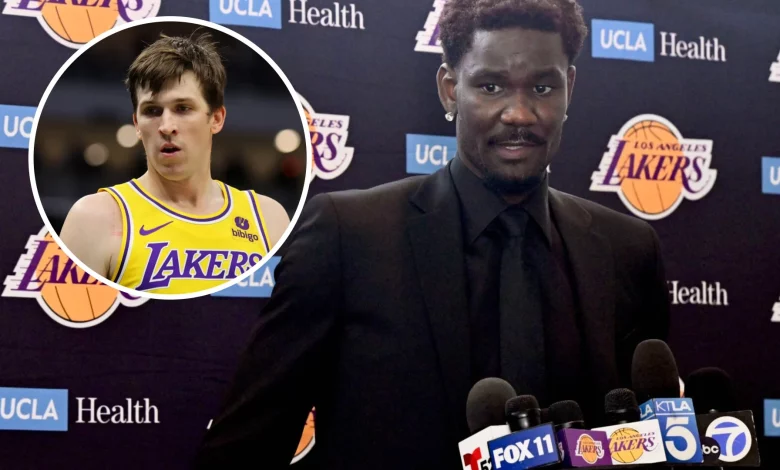
In the high-stakes environment of the NBA, player development often hinges not only on individual talent but also on mentorship, leadership, and the transfer of knowledge from experienced veterans to emerging stars. Mychal Thompson, a seasoned NBA veteran and former Los Angeles Lakers champion, has expressed his willingness to serve as a mentor to Deandre Ayton, a promising young center seeking to elevate his game and carve out a significant role in Los Angeles. Thompson’s statement, “You could be the next great Lakers center, it’s up to you,” encapsulates a belief in Ayton’s potential and a desire to contribute to his growth. This analysis explores the various dimensions of this mentorship dynamic, its potential impact on Ayton’s career, and what it signifies for the Lakers’ broader strategic approach.
The Context: Deandre Ayton’s Career Trajectory and the Lakers’ Roster Aspirations
Deandre Ayton, a former No. 1 overall pick, has demonstrated flashes of brilliance but has also faced criticism for consistency and fit within his previous teams. His strengths include rebounding, shot-blocking, and offensive versatility, making him a valuable asset at the center position. However, to reach his full potential and become a perennial All-Star or franchise centerpiece, Ayton requires not only skill refinement but also guidance in handling NBA pressures, leadership expectations, and playoff battles.
The Los Angeles Lakers, a franchise with a storied history of success, are in a period of transition, seeking to rebuild around their core stars—most notably LeBron James and Anthony Davis—and develop a roster that balances veteran experience with youthful talent. Bringing in Ayton signals a desire to bolster their frontcourt with a player capable of anchoring the defense, providing scoring, and contributing to team chemistry.
Mychal Thompson’s willingness to mentor Ayton is noteworthy because it embodies a culture of shared knowledge, leadership, and mentorship that the Lakers hope to foster. It also suggests that the team recognizes the importance of nurturing young talent internally rather than relying solely on external acquisitions or draft picks.
Mychal Thompson’s Background and Philosophy: The Power of Mentorship
Mychal Thompson’s career in the NBA and his subsequent role as a Lakers analyst and veteran voice provide him with a unique perspective on player development. As a former first-round pick who won championships with the Lakers in 1987 and 1988, Thompson understands what it takes to succeed at the highest level. His experiences of overcoming challenges and learning from seasoned players shape his approach to mentorship.
Thompson’s philosophy emphasizes patience, discipline, and continuous learning. He advocates for players to embrace their roles, develop their game systematically, and understand the importance of teamwork and leadership. His willingness to mentor Ayton demonstrates a genuine desire to pass on wisdom, help him navigate the league’s demands, and unlock his full potential.
Furthermore, Thompson’s reputation as a respected former player and current analyst positions him as a credible and approachable mentor figure. His insights into NBA strategy, culture, and the intricacies of playing in Los Angeles equip him to guide Ayton not just on the court but also off it—covering aspects such as media relationships, handling expectations, and maintaining focus.
The Potential Impact of Thompson’s Mentorship on Deandre Ayton’s Development
1. Skill Refinement and Tactical Growth
One of the primary benefits of veteran mentorship is technical and tactical development. Thompson can share insights on positioning, footwork, rebounding techniques, and offensive spacing—areas where Ayton can improve to become more dominant. By observing Thompson’s approach, Ayton can learn how to better read defenses, improve his footwork in the post, and develop a more refined mid-range and free-throw shooting ability.
2. Leadership and Confidence Building
Young players often struggle with confidence, especially when facing high-pressure playoff environments. Thompson’s mentorship can provide Ayton with reassurance, guidance on handling media scrutiny, and strategies for leading by example on and off the court. Confidence is crucial for a center expected to anchor a team’s defense and contribute offensively, and Thompson’s support can help Ayton develop that mental toughness.
3. Cultural Integration and Team Chemistry
Ayton’s transition to the Lakers involves adapting to a new team culture, coaching staff, and expectations. Thompson, as a Lakers legend, can serve as a bridge, imparting knowledge about franchise history, team values, and the importance of chemistry. This cultural mentorship can accelerate Ayton’s integration into the Lakers’ system and foster a sense of belonging and accountability.
4. Long-term Vision and Career Longevity
Thompson’s mentorship can also help Ayton understand how to maintain longevity in the league—balancing physical health, workload management, and mental resilience. By sharing his own experiences, Thompson can influence Ayton to adopt habits that support sustained success, positioning him as a potential franchise centerpiece.
The Broader Significance for the Lakers: Building a Culture of Development
The Lakers’ willingness to foster internal mentorship reflects a broader organizational philosophy emphasizing player development, leadership, and culture-building. Historically, successful franchises like the Lakers have thrived not only because of star talent but also due to strong leadership and the cultivation of future leaders within the team.
By positioning Thompson as a mentor, the Lakers aim to create an environment where young players feel valued, guided, and motivated to reach their full potential. This approach can lead to a more cohesive team, reduce reliance on external fixes, and develop a pipeline of talent capable of maintaining competitiveness over multiple seasons.
Furthermore, this mentorship aligns with the Lakers’ strategic focus on maximizing the potential of their roster before making additional moves or pursuing high-profile free agents. It signals a long-term commitment to developing internal talent, which can be more sustainable financially and culturally.
Deandre Ayton’s Potential: The “Next Great Lakers Center” Narrative
Thompson’s statement that Ayton could be “the next great Lakers center” underscores a belief in his ceiling and the importance of mentorship in unlocking latent potential. The Lakers have a storied history of legendary centers—Kareem Abdul-Jabbar, Shaquille O’Neal, and others—whose dominance defined eras of success.
For Ayton to become a Lakers legend, he must develop not only his skills but also his leadership qualities, basketball IQ, and mental toughness. Thompson’s mentorship can be instrumental in this journey, providing the guidance needed to elevate Ayton from a promising young player to a franchise cornerstone.
This narrative also serves to motivate Ayton, instilling confidence that he has the opportunity to leave a lasting legacy with the Lakers—an organization that values excellence at the center position.
Challenges and Opportunities in Mentoring a Young Center
While mentorship offers numerous benefits, it also presents challenges. Ayton, like any young player, must be receptive to guidance, willing to learn, and committed to growth. Thompson’s approach must be tailored to Ayton’s personality, needs, and aspirations.
Opportunities include:
Developing a tailored training regimen focusing on weaknesses.
Instilling a professional mindset for handling fame and expectations.
Fostering leadership qualities that can inspire teammates.
Building a strategic understanding of game situations.
Challenges include:
Ensuring that mentorship does not become overly paternalistic or controlling.
Maintaining open communication to adapt guidance as Ayton evolves.
Balancing mentorship with the player’s autonomy and confidence.
Successful mentorship hinges on mutual respect, trust, and a shared vision for growth.
The Future Outlook: A Partnership for Success
If Thompson’s mentorship proves effective, it could significantly impact Ayton’s trajectory, helping him realize his potential as a dominant NBA center. This partnership signifies the Lakers’ investment in internal development and their belief that nurturing talent from within can yield long-term success.
Furthermore, Ayton’s growth under Thompson’s guidance could transform him into a cornerstone of the Lakers’ future, contributing to championship pursuits and elevating the franchise’s legacy.
The mentorship also exemplifies a broader NBA trend—franchises recognizing that player success often depends on holistic development, including technical skills, mental resilience, and cultural fit.
A Bold Step Toward Development and Legacy
Mychal Thompson’s willingness to serve as a mentor to Deandre Ayton encapsulates a proactive, growth-oriented approach to building a successful team. His belief that Ayton “could be the next great Lakers center” reflects confidence in his potential and a commitment to guiding him toward that goal.
This mentorship symbolizes more than just individual development; it signifies a cultural investment in nurturing internal talent, fostering leadership, and establishing a legacy of excellence. If successful, it could not only elevate Ayton’s career but also contribute to the Lakers’ sustained competitiveness and championship aspirations.
In the evolving landscape of the NBA, such initiatives highlight the importance of mentorship, experience, and shared vision—elements that can turn promising players into legends and teams into dynasties. With the right guidance, Deandre Ayton has the opportunity to realize his full potential, and Mychal Thompson’s support could be a pivotal factor in that journey, ultimately shaping the future of the Los Angeles Lakers.

